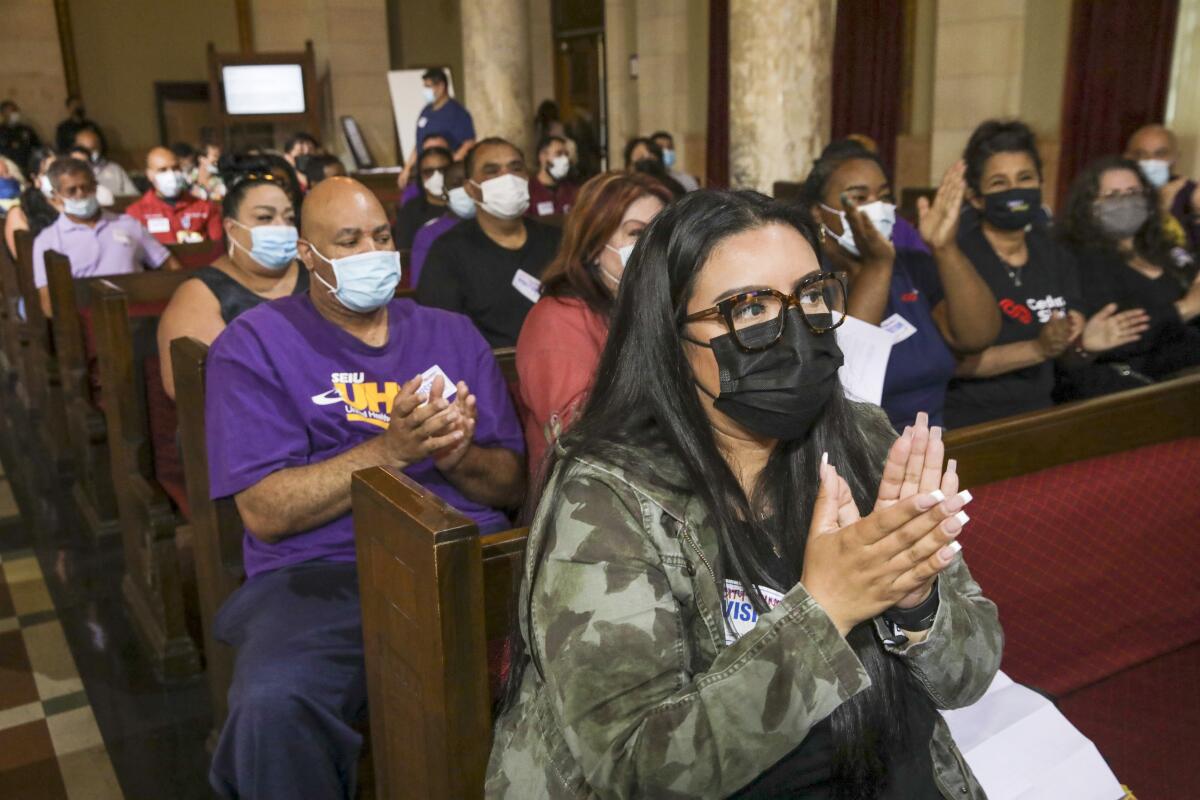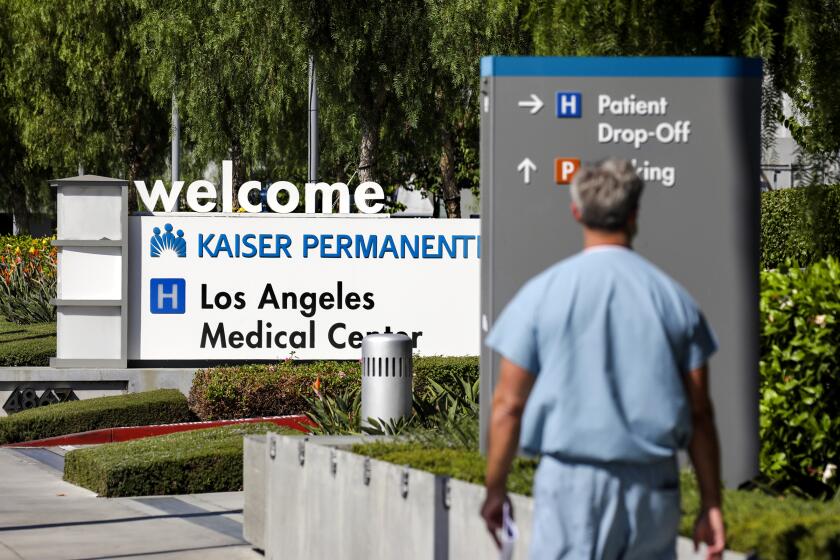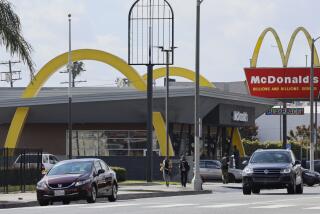Hospitals launch campaign to repeal L.A.’s new healthcare minimum wage

A coalition of Los Angeles hospitals and other health facilities launched a campaign on Tuesday to repeal a newly enacted ordinance boosting the minimum wage for thousands of healthcare workers to $25 per hour, saying the law will have a harmful effect on medical care across the city.
The No on the Unequal Pay Measure Coalition, a group sponsored by the California Assn. of Hospitals and Health Systems, said it will start gathering signatures this week for a referendum to put the wage hike question in front of voters.
To qualify the referendum for the ballot, the coalition would need to gather nearly 41,000 valid signatures from L.A. voters within 30 days. Such a move, if successful, would block the wage increase from going into effect — at least until an election to determine its fate.
The coalition acted just days after Mayor Eric Garcetti signed the measure into law. Appearing last week at a signing ceremony for the ordinance, he said the wage hike would result in better healthcare, helping hospitals and other facilities retain their workers and reduce employee turnover.
The Los Angeles City Council voted Tuesday to boost the minimum wage of workers at privately owned hospitals to $25 an hour.
“This is going to make your industry stronger,” Garcetti told workers with Service Employees International Union-United Healthcare Workers West, the union that has pushed for the wage increase.
Foes of the wage increase sharply disagree, saying it will abruptly upend the finances of the region’s healthcare facilities and jeopardize access to health services.
At Gateways Hospital and Mental Health Center in Echo Park, administrators said they are weighing whether to scale back operations — possibly by as much as 20% — as a way of absorbing the increased costs. That 300-bed psychiatric facility serves a large number of people who are either homeless or at risk of becoming homeless, hospital CEO Phil Wong said in an interview.
In Woodland Hills, the nonprofit Motion Picture and Television Fund is now looking at how to cover a $1.5-million yearly increase in labor costs, according to Bob Beitcher, the fund’s chief executive. That increase is currently set to take effect in August.
Beitcher said some security guards at the motion picture fund’s 300-bed campus, which provides care for seniors who have retired from the entertainment industry, would receive pay increases of 40% to 50%. Some nursing assistants would see pay hikes of 30% to 40%, he said.
“The only way we could absorb that is either to cut back on services, which isn’t something we’d like to do, or fundraise another million and a half [dollars] per year,” he said.
The City Council voted to approve the wage increase last month, hiking the pay for a range of employees, including security guards, receptionists, nursing assistants, housekeepers, groundskeepers, janitors and others who work at privately run hospitals, clinics and skilled nursing facilities that are part of such hospitals, and dialysis clinics, among other health facilities specified under the measure. They did so over the objections of hospital executives, who said the city didn’t bother to analyze the financial impact on the region’s medical system.
SEIU-UHW originally collected more than 145,000 signatures to put the pay increase on the Nov. 8 ballot. Councilmen Curren Price and Marqueece Harris-Dawson decided to move more quickly, pushing their colleagues to adopt the measure immediately.
“Now’s the time to show these workers that we see them, that we appreciate them, and that we appreciate all the sacrifices” made since the outbreak of COVID-19, Price said last month, before the council cast its first of two votes on the ordinance.
SEIU-UHW has endorsed six of the council’s 15 members in this year’s election, including Price, who just won a third term representing part of South Los Angeles. Two of them — Councilmen Mitch O’Farrell and Paul Koretz — are on the ballot on Nov. 8. (Rep. Karen Bass, a candidate for mayor, also has the union’s backing.)
For weeks at City Hall, union members argued that healthcare companies have reaped huge profits while workers at the bottom of the ladder struggled to pay for gas and rent — at times turning to second jobs.
Get the lowdown on L.A. politics
Sign up for our L.A. City Hall newsletter to get weekly insights, scoops and analysis.
You may occasionally receive promotional content from the Los Angeles Times.
Mauricio Medina, a nursing assistant who works at Southern California Hospital at Hollywood, said many of his colleagues have been considering quitting and looking for better-paying jobs outside of the medical profession.
“One of my co-workers who just welcomed a new baby was just served with an eviction notice, because he and his wife are behind on their bills,” said Medina, who lives downtown. He said he and his colleagues set up a GoFundMe to help the co-worker pay for his infant’s diapers and milk.
The union has estimated that the higher pay will cover about 4,500 unionized workers and potentially more than 10,000 non-union workers across than 102 workplaces, including those operated by Kaiser Permanente and Cedars-Sinai Medical Center. About half of the workplaces covered by the measure would be dialysis centers, according to an SEIU-UHW representative.
After the hospital group launched its effort to halt the wage measure on Tuesday, SEIU-UHW spokesperson Renée Saldaña said that “greedy hospital executives have experienced record pandemic windfalls, yet they have no plan to address the staffing crisis plaguing Los Angeles hospitals.”
“They are out of step with local voters if they think the solution is to slash wages for the caregivers who got us through the pandemic,” Saldaña said. “The problem that needs to be addressed is bloated executive compensation that is driving up healthcare costs for Angelenos.”
Hospital representatives have portrayed the ordinance as arbitrary and unfair because it covers only a fraction of health facilities, excluding hospitals run by county government, such as Olive View-UCLA Medical Center in Sylmar and LAC+USC Medical Center, and federally qualified health centers — community clinics that provide care to underserved areas or populations.
They predicted workers at public hospitals and community clinics would likely seek high-paying jobs at private ones, creating a talent drain for facilities operating in low-income communities.
George Greene, president and CEO of the Hospital Assn. of Southern California, pushed back on the idea that the region’s hospitals are hugely profitable. Many, he said, are “reeling” financially after 2½ years fighting a pandemic, he said.
“There was no analysis of what this would cause for hospitals,” Greene said.
Union officials said their measure did not cover public facilities because the city could not set rates for county and state workers. SEIU-UHW is also backing a bill in the state Legislature to boost wages at federally qualified health centers to at least $25.
“All healthcare workers should earn a $25 minimum wage, but there are different avenues to get there,” Saldaña said.
For the record:
10:18 a.m. July 13, 2022This article has been updated to clarify the details of a law that governs wages for many of L.A.’s hotel workers.
Private hospital employees are not the only workers to have secured their own minimum wage in Los Angeles. Unite Here Local 11, which wages independent campaigns to elect candidates for city office, successfully fought for a higher minimum wage for many L.A. hotel workers, which is now $18.86 under city law.
For other workers in L.A., the minimum wage is $16.04 per hour.
Times staff writer Emily Alpert Reyes contributed to this report.
More to Read
Start your day right
Sign up for Essential California for news, features and recommendations from the L.A. Times and beyond in your inbox six days a week.
You may occasionally receive promotional content from the Los Angeles Times.








